Research
Mak-RIF Round 4 Call For Applications
Published
3 years agoon
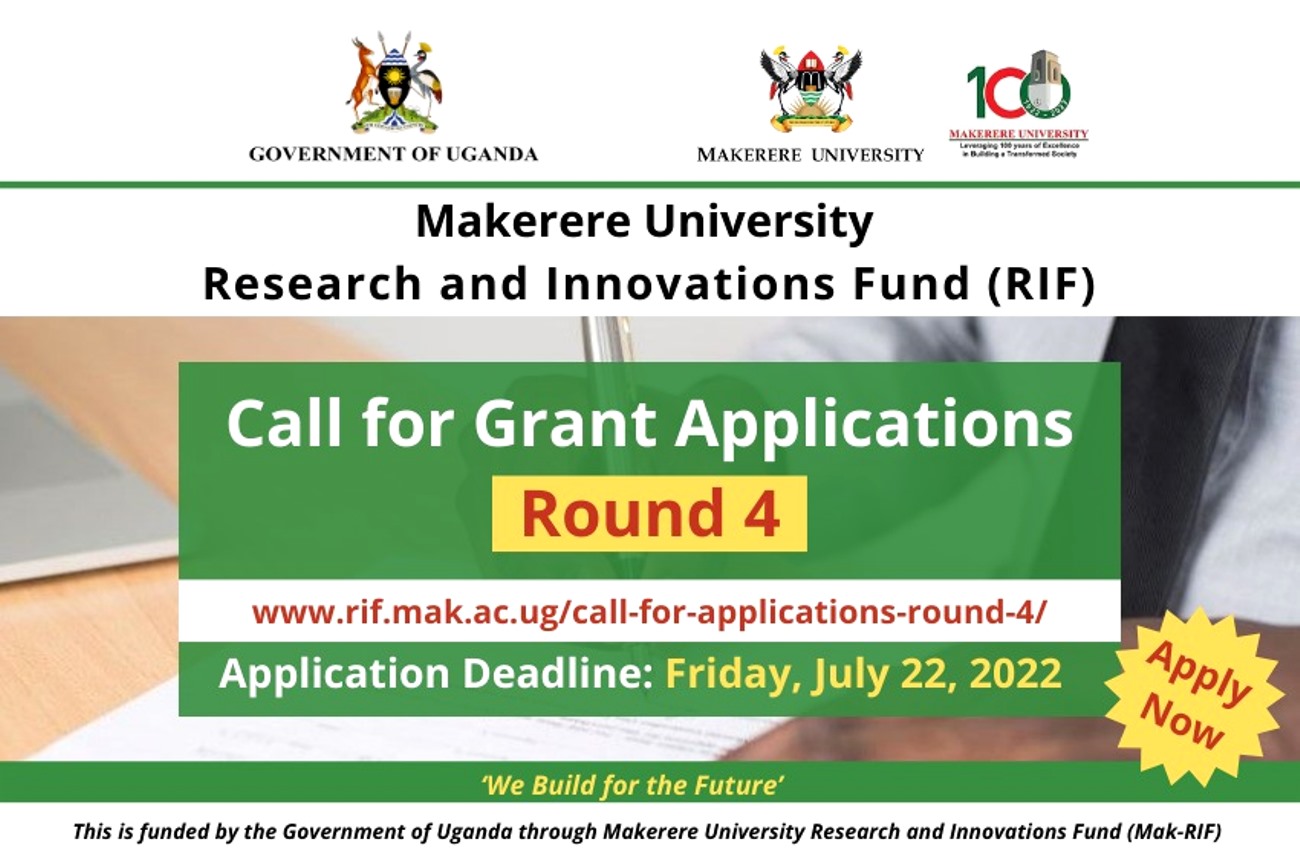
Makerere University Research and Innovations Fund: Request for Applications (RFA) Supported by the Government of the Republic of Uganda
Round 4, Track 1: New Research & Innovation Agenda-based Proposals Financial Year 2022/2023
SECTION A: BACKGROUND
A1. Funding opportunity description
Makerere University received special funding from the Government of the Republic of Uganda, to support high impact Research and Innovations. The Financial Year 2022/23 will be the fourth year of this fund’s availability. The fund illustrates the increasing importance that the Government attaches to Research and Innovation as a driver of socio-economic transformation. The objective of the fund is to increase the local generation of translatable research and scalable innovations that address key gaps required to drive Uganda’s development agenda. The fund is therefore aimed at complementing available funding to address unfunded priorities critical to accelerating development. Over the last three Financial Years (2019/2020, 2020/21 and 2021/2022), government appropriated 79 Billion Uganda Shillings. Between the three years, MakRIF has funded a total of 775 projects across all sectors critical for development, of which 204 have been completed. In the next Financial Year (2022/23), Makerere University expects to receive about 30 Billion Uganda shillings (about US$ 8,100,000) under the Government Research and Innovation Fund (RIF). Of this, at least 6 Billion Shillings will fund new ideas that respond to a widely consultative Research Agenda focused on national priorities while the rest will fund continuing projects from previous financial years, extension of multi-year projects, needs based priorities, and commercialization/scaling of prior funded projects. The Makerere University Research and Innovation Grants Management Committee (GMC) therefore announces the RIF Round 4, Track 1 (New Research & Innovation Agenda-Based Grants). Available funds are obligated for the Financial Year 2022/2023. The GMC therefore invites applications with original ideas that demonstrate a clear link to key thematic areas of the National Research and Innovation Agenda.
A2. Research for Economic Development
To transition to middle-income status, low-income countries must increasingly invest in research and innovations that provide solutions to persistent development challenges. Universities should be at the fore-front of driving this research agenda. The Government of Uganda is currently implementing the 3rd National Development Plan (NDP) (2020/21 – 2024/25). However, the NDP and sector specific plans require research to fill evidence gaps. The main objective of the RIF is to support R&I initiatives that contribute to better delivery of National Development initiatives in all sectors critical to the economy.
A3. Scope and Technical Description of the Research and Innovation Grant
The RIF GMC’s terms of reference include development of an instructive research agenda as the basis for identifying funding priorities. The GMC conducted a comprehensive stakeholder consultation to identify priority thematic areas of interest for national development. These consultations included meetings with representatives from key government sectors, semi-autonomous government agencies, the private-for-profit sector and civil society. The GMC triangulated this information with that from the National Development Plan III, the Makerere University Strategic Plan and Research Agenda and the critical areas spelled out in the National Budget for FY2022/2023. The RIF Round 4, Track 1 (Research & Innovation Agenda-Based Grants) will therefore specifically target research and innovation projects that align with priority thematic issues in the instructive Research Agenda that arose from these consultations. Research and Innovation ideas are therefore sought in the following thematic areas:
Theme 1: Transforming the agricultural sector to drive development
Theme 2: Achieving Sustainable health as a means to sustainable development
Theme 3: Re-imagining Education to unlock capacity for economic development
Theme 4: Water, sanitation and the environment: A pre-requisite to sustainable development
Theme 5: Harnessing the social sector, culture and arts to drive development
Theme 6: Harnessing tourism, wildlife and heritage to drive development
Theme 7: Sustainable Planning, finance and monitoring as catalysts for growth
Theme 8: Leveraging public service and local administration for efficient service delivery
Theme 9: Defense and security: Achieving sustainable peace and stability
Theme 10: Strengthening law, governance, human rights and international cooperation as pre-requisites for development
Theme 11: Harnessing Information and Communication Technology to drive development
Theme 12: Works, manufacturing, science and technology as tools to accelerate development
Theme 13: Solutions to catalyze business and enterprise
Theme 14: Energy and Minerals as drivers of rapid economic development
The Government Research & Innovation (R&I) Grants will cover all technical disciplines in Makerere University as long as the research questions align with the instructive research agenda themes above. Particular attention will be paid to unfunded priorities, those for which funding has been inadequate, or for which available funding only covers one or a few of the components needed to inform development initiatives in a holistic way. This grant is not primarily meant to supplement existing research projects that already have funding from other sources. However, researchers can apply on the platform of existing projects if they provide a strong justification that there are important funding gaps in the current research project and the added deliverables expected from the additional support to the existing research effort. This grant also emphasizes a multi-sectoral approach. Research groups are therefore encouraged to work with other sectors that complement their technical focus.
A4. Categories and size of grants to be issued:
Grants will be issued in the following categories:
| Categories | Amount (UgX) | Approximate No. of Projects* | Res. | Innov. | Total |
|---|---|---|---|---|---|
| Cat 1 | Up to 200,000,000 | Approx. 20 | 10 | 10 | 2,000,000,000 |
| Cat 2 | Up to 100,000,000 | Approx. 34 | 17 | 17 | 3,400,000,000 |
| Cat 3 | Up to 50,000,000 | Approx. 22 | 11 | 11 | 1,100,000,000 |
| Approx. 76 | 38 | 38 | 6,500,000,000 |
Res= primarily research/research ecosystem-based; Innov= primarily Innovation-based
Note:
- The R&I Grants Management Committee reserves the right to determine/change the number and size of awards based on prevailing circumstances informed by demand, quality of applications, availability of funds and level of utilization of funds by grantees. 50% of all awards will go to research or ecosystem strengthening projects while 50% will go innovation-based projects.
- **Experience from earlier RIF calls showed that most applicants (Over 50%) target Category 1 which creates a lot of competition and many otherwise good proposals being un-funded. Applicants for RIF-4 are encouraged to consider all categories.
- *** Junior Faculty Researchers are STRONGLY encouraged to apply. (Junior Faculty are not defined by age, but by rank and research experience. They are specifically defined as researchers at the rank of Lecturer or below and researchers with less than 5 years of experience in research/innovation or less than 2 years as independent researchers/innovators, or have never been PIs for a research/innovation project greater than US$ 100,000 (or 365 Million Uganda Shillings).
Grant timeline
| Milestone | Dates |
|---|---|
| 1. Issuance of RFA (Soft launch) | Wednesday 22nd June 2022 |
| 2. Researcher sensitization meeting | Thur 30th June 2022 [Meeting details] |
| 3. Q&A period | Tuesday 28th June 2022 to Tuesday 5th July 2022 |
| 4. Posting of FAQs | Wednesday 6th July 2022 |
| 5. Researcher Support Webinar | Friday 8th July 2022 |
| 6. Closing date for applications | Friday 22nd July 2022 |
| 7. Selection – stage 1 | Monday 25th July to Friday 29th July 2022 |
| 8. Selection – stage 2 | Monday 1st August to Sunday 28th August 2022 |
| 9. Selection – stage 3 | Monday 29th August to Thursday 1st September 2022 |
| 10. Award notification | Friday 2nd September 2022 |
| 11. Induction | Tuesday 6th September 2022 |
Please below for the detailed Call For Applications and Circular.
You may like
-
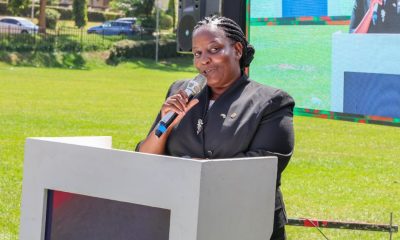

Emorimor Calls for Makerere to Upgrade Parenting Course
-
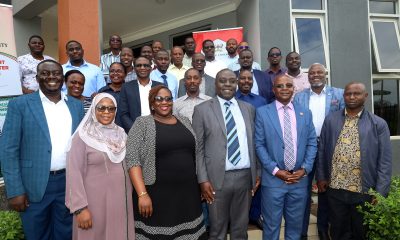

Uganda Deepens Economic Governance with Training on Regulatory Cost-Benefit Analysis
-


UVCF Makes Case for HEAC Programme
-


Mastercard Foundation Board pays its inaugural visit to Makerere University
-
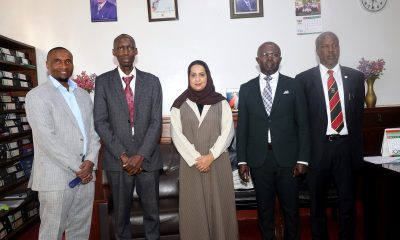

Mak CEES discusses partnership with King Salman Global Academy for the Arabic Language
-


Meet Safali Libia, a Mastercard Foundation Scholar-alumnus who rebuilt his life as a refugee in Uganda
Agriculture & Environment
NbS4Tea Project Team Makes Great Progress, Deploys Drones for Data Collection
Published
6 days agoon
June 24, 2025
****Funded by the Danish Fellowship Centre under Denmark’s Ministry of Foreign Affairs, NbS4Tea is a five-year initiative aimed at enhancing climate resilience and tea productivity in Uganda.
Launch of drones for data collection
The Nature-based Solutions for Tea (NbS4Tea) project has registered a significant milestone with the successful deployment of drones to improve environmental and agricultural data collection.
On 19th June 2025, the project team officially launched the drones at the Rwebitaba Tea Research Centre in Kyenjojo District, the project’s main research hub. The launch event included hands-on training sessions by Mr. Timothy Mutungi, a certified Remote Sensing Drone Pilot. Mr. Mutungi provided detailed instruction on drone operation, safety procedures, and data acquisition techniques specifically tailored to the project’s goals. The training was attended the core NbS4Tea researchers as well as students supported by the project.

By utilizing drone technology, the team will be able to capture high-resolution imagery and gather critical environmental data across vast tea-growing areas. This will enable more precise assessments of biodiversity, soil health, water use, and overall ecosystem services. The valuable insights generated will guide the development of sustainable, nature-based agricultural practices with the potential for widespread adoption throughout the tea industry.
About the NbS4Tea Project
NbS4Tea is a five-year initiative aimed at enhancing climate resilience and tea productivity in Uganda. Funded by the Danish Fellowship Centre under Denmark’s Ministry of Foreign Affairs and led by Dr Emmanuel Arthur from Aarhus University, the project is being implemented through a consortium of Ugandan and Danish institutions namely: Makerere University, the National Agricultural Research Organization (NARO), Uganda, Uganda Tea Association, Aarhus University, Denmark, and Kick-start International.

The primary objective of the project is to sustainably close the tea yield gap in Uganda by developing research-driven, nature-based solutions that enhance the climate resilience of tea production systems. This involves identifying climate-resilient tea varieties, integrating tea prunings and banana by-products, utilizing nitrogen-fixing agroforestry trees, and improving irrigation management. The approach emphasizes socio-economic feasibility, capacity building in research, and a market-oriented, multi-stakeholder collaboration to ensure both environmental and economic sustainability.
At Makerere University, the project is coordinated by Dr Alex Nimusiima from the Department of Geography, Geo-Informatics and Climatic Sciences at CAES. Other Project members are; Dr Grace Nakabonge from the Department of Forestry, Biodiversity and Tourism; Dr Prossy Nakawuka from the Department of Agricultural and Bio-systems Engineering; Dr Twaha Ali Basamba from the Department of Agricultural Production; and Dr Alice Turinawe from the Department of Agribusiness and Natural Resource Economics.

Specific objectives
- Identify and quantify climate change impacts on tea yield and quality based on historical and newly obtained data and novel data mining methods.
- Screen, select and recommend tea varieties adapted to abiotic (drought and heat) and biotic stresses (diseases and pests).
- Develop new knowledge on the potential of local waste biomass (tea prunings, banana pseudostems and peels) as soil amendments- mulch, compost, biochar, to recycle nutrients, improve soil fertility, increase carbon sequestration and alleviate drought.
- Reveal NbS through agroforestry combined with organic mulch, irrigation and resilient tea varieties that increase biodiversity and tea yield.
- Innovate new methods to enhance tea production under climate change through rainwater harvest and climate-smart irrigation infrastructure.
- Empower vulnerable groups (women, youth, and people with disabilities) in tea production and processing to ensure multi-actor involvement and socio-economic benefit outreach of the proposed NbS in tea cultivation and production.
- Identify export market strategies for NbS tea products, aligned with consumer preferences.

Progress thus far
Launched in January 2024, the project, organized in five work packages, has registered significant progress. Each of the work packages listed below supports one PhD student and one Masters’ student. The PhD students are: i) Mr. Adiga Hassan from the Department of Geography, Geo-Informatics and Climatic Sciences at CAES conducting research under work package 1; ii) Ms. Sarah Namayengo from the Department of Forestry, Biodiversity and Tourism conducting research under work package 2; Ms. Vivian Namutebi from the Department of Soil Science and Land Use Management undertaking research on work package 3; Mr. Keneth Chelimo from the Department of Agricultural and Biosystems Engineering conducting his research under work package 4; and Ms. Moreen Asasira from the Department of Agribusiness and Natural Resource Economics focusing on work package 5. The Masters students are: i) Ms. Evelyn Katasi from the Department of Environmental Management at CAES (work package 1), Mr. Vereriano Turyahebwa from Department of Forestry, Biodiversity and Tourism (work package 2); Mr. Ben Okurut from the Department of Soil Science and Land Use Management (work package 3); Mr. Augustine Okot from the Department of Agricultural and Biosystems Engineering (work package 4); and Mr. Augustine Kigozi from the Department of Agribusiness and Natural Resource Economics (work package 5)

Work packages and achievements registered
Work Package 1: Climate change impacts on tea yield and quality – Headed by Dr. Alex Nimusiima
This work package centres on the analysis of historical and projected climate conditions in the study area. It examines how current climate patterns influence tea production, as well as the potential effects of future climate change on tea yield and quality.
Progress
i) A household survey assessing the socio-economic status of tea farmers and the effects of climate variability on their livelihoods has been completed.
ii) The collected data has been cleaned, and the Masters student supported under this work package is currently writing her thesis based on the survey findings.
iii) A historical climate analysis of the study area has been conducted by the PhD student, who is now preparing a manuscript.

Work Package 2: Screening & selecting tea genotypes for resilience to abiotic and biotic stresses – Headed by Assoc. Prof. Grace Nakabonge
This work package focuses on evaluating existing tea genotypes for their resistance to pests and diseases, using chlorophyll fluorescence imaging as a diagnostic tool.
Progress
i) A screen house has been constructed to serve as the experimental site.
ii) Germplasm from two tea varieties is currently being cultivated in the screen house in preparation for the upcoming experiments.
iii) A drone has been acquired to assist in data collection for this work package.

Work Package 3: Evaluation of NbS for climate resilience, higher yield and biodiversity- Headed by Assoc. Prof. Twaha Ali Basamba
This focuses on the characterization of mulch and biochar derived from tea prunings to improve soil health. It also aims to quantify the added value of Nature-based Solutions (NbS) in enhancing tea productivity, promoting climate resilience, and supporting biodiversity.
Progress
- So far, Biochar has been produced from tea prunings and characterized.
- The Masters student supported under this work package is writing his thesis on the results of biochar characterization.

Work Package 4: Innovating smart and scalable irrigation technology for improved tea production- Headed by Dr. Prossie Nakawuka
This work package aims to develop and evaluate smart, scalable irrigation solutions to boost tea production. It focuses on assessing how irrigation impacts tea yield and quality, measuring water use efficiency, and analyzing the economic returns of irrigation practices. Additionally, it explores deficit irrigation and climate-resilient strategies to ensure sustainable tea farming in changing environmental conditions.
Progress
- The irrigation infrastructure is now in place and fully operational at Rwebitaba Tea Research Centre in Kyenjojo District.
- The experimental plots for irrigation experiments are already in place with water pipes.

Work package 5: Socio-economic assessment of tea-agroforestry and selected tea varieties – Headed by Dr. Alice Turinawe
This work package emphasizes co-creation within multi-stakeholder innovation networks to evaluate the economic feasibility and market access of tea agroforestry systems. It also focuses on promoting gender balance and understanding consumer valuation of Nature-based Solutions (NbS) tea from Uganda.
Progress
To date, two co-creation workshops have been successfully conducted and the Masters student under this work package is currently analyzing the workshop results as part of their research.

Expected outputs and outcomes
- Increased tea production, productivity, and biodiversity through the adoption of NbS.
- Increased research and technical capacity of Makerere and R-ZARDI.
- Holistic stakeholder insight on economic feasibility, consumer acceptance and market access strategies, especially for vulnerable groups in the tea value chain.
- Increased job prospects for youth and women in tea production sub-sectors.
- Improved social status and increased incomes of tea farmers, traders, and exporters.
- Improved economic and environmental quality by recycling biomass waste into value-added products dedicated to soil enhancement.
- 4+ high-yielding tea genotypes adapted to drought and heat, diseases and pests.
- 15+ scientific articles, conference presentations.
- Five PhDs and Five MSc degrees.
- Market access assessment and empowerment.

Details on the project: https://news.mak.ac.ug/2024/01/new-caes-project-to-improve-tea-production-in-uganda/
More photos from the event



General
Directorate of Graduate Training Rolls out Research Management Information Sytems (RIMS)
Published
3 weeks agoon
June 12, 2025By
Mak Editor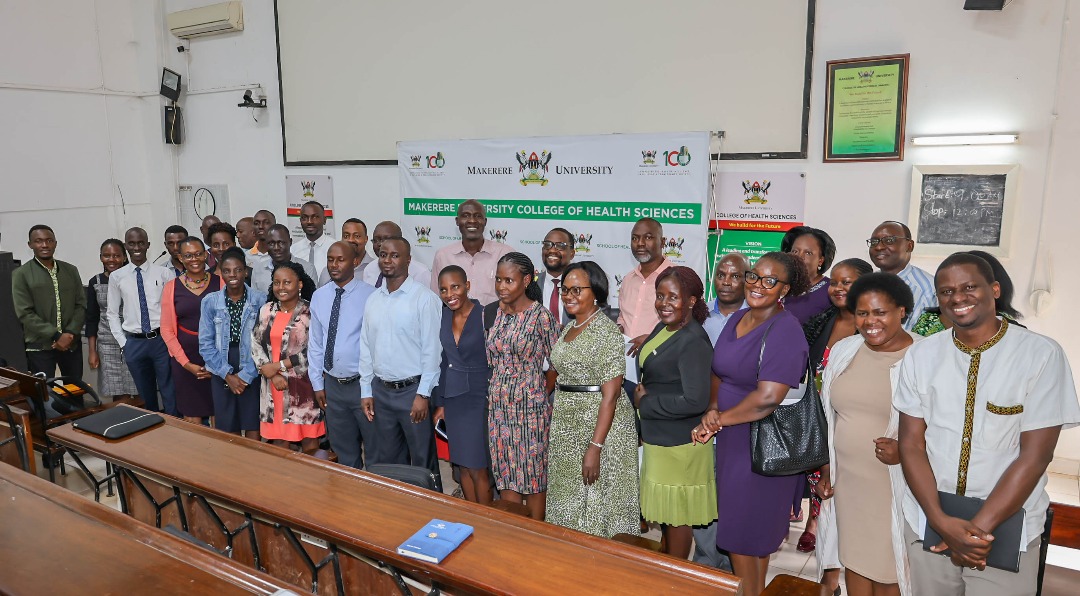
By: Moses Lutaaya
The Directorate of Graduate Training is rolling out the Research Management Information systems (RIMS) to efficiently and effectively monitor the academic progress of all graduate students.
“RIMS will be used to track efficiently every stage of activity of graduate studies from course works, research concept to thesis completion.” The Director of Graduate Training, Prof. Julius Kikooma said.
He added, “The RIMS team is here to share developments on the system that are designed to support the agenda of Makerere university. When graduate students enter a given chapter of their research works, their supervisors will automatically receive mail prompts to swiftly handle, give comments and guide the students on the way forward.”
During the roll out training recently at the College of Health Sciences in Mulago, Prof. Kikooma said, “The Directorate of Graduate Training is working in collaboration with Directorate of Innovation, Research and Partnerships (DIRP) and the Directorate of Information Communication and Technology Support (DICTS) to ensure a smooth training to all the schools and colleges. Digitalising the graduate management process is anticipated to increase the number of graduate admissions and completion in the long run.”
“As the three directorates, we sat and reviewed the university graduate strategy and policies around it. We got reviewed policies and procedures approved by the University Senate last year. We no longer have provisional admission letter requirement for our PhD students. It is now full admission straight away and we follow a cohort system of admission for the PhD by research students.” He added.
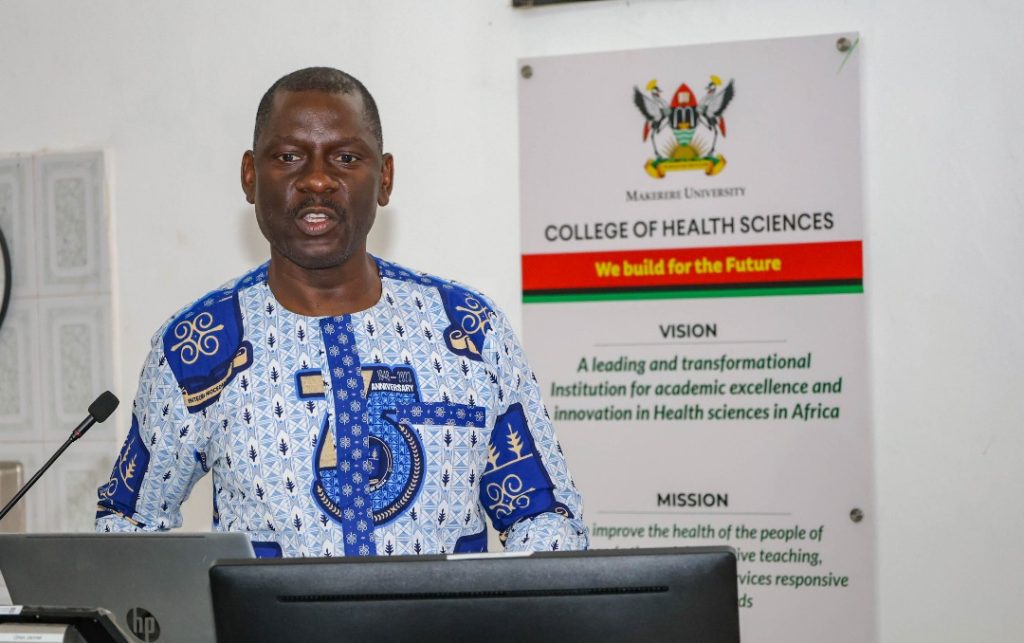
RIMS is a version of how the Directorate of Graduate Training aims to handle the process of systematic tracking of every point of progress in the entire academic journey of graduate students.
The Directorate of Graduate Training has so far conducted the RIMS training at three Colleges namely; College of Health Sciences (CHS), College of Business and Management Sciences (COBAMS) and College of Natural Sciences (CONAS).
The critical stakeholders on the RIMS value chain include Heads of Departments, College Principals and Deputy Principals, Directors, School Deans, Supervisors as well as Graduate coordinators. “All the above are key actors and must be able to use RIMS in the graduate process, capturing all profiles of students and supervisors and should be able to use it appropriately.” He emphasized.
He said that RIMS will bring all stakeholders on the same page and will be able to adequately troubleshoot any hinderance to progress when course works are done, to dissertation and thesis completion. Makerere university target is to increase its graduate students’ enrollment from 19% to at least 30% in the next five years.
Prof. Bruce James Kirenga, Principal College of Health Sciences welcomed RIMS training saying that this kind of E- learning and supervision tracking is the way to handle graduate studies as it seems to reduce the turn around time for student- supervisor responses.
“Every activity in the graduate students learning journey is monitored swiftly. Whatever the students upload on to the system, supervisors get message pop-ups on their mails, review the works immediately and attach comments for the students to appreciate and manage appropriately.” He said.
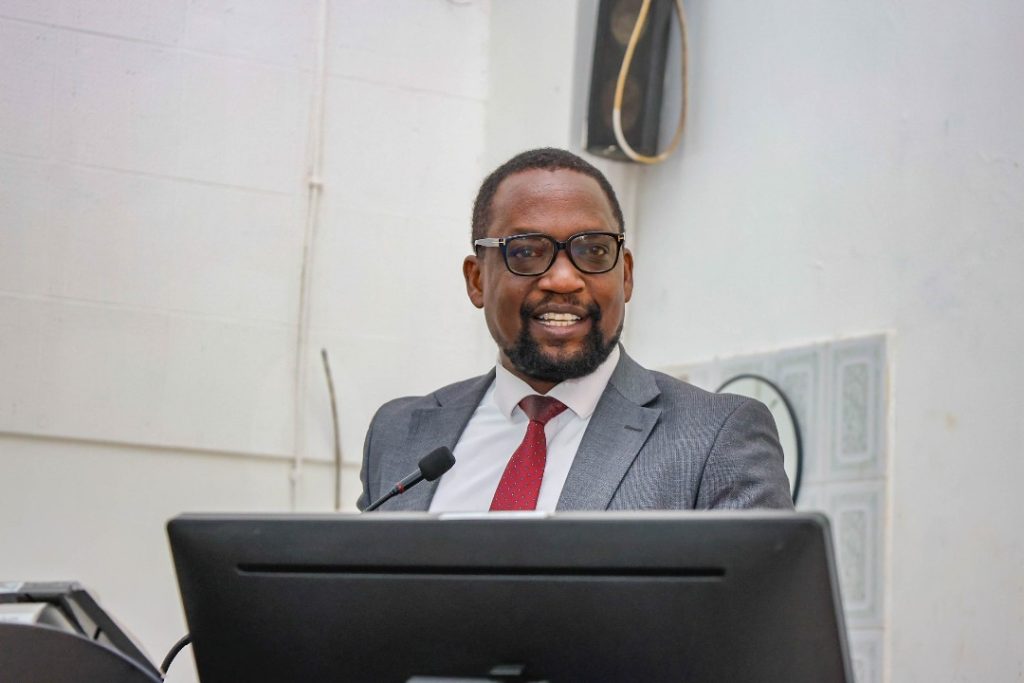
Prof. Kirenga added that the audit trail created under RIMS will provide good progressive academic reports and improve the journey to Doctoral studies.
“Heads of Departments are able to see all students in the department, any pending system approvals, observe completion rates and total progressive over view of each student and that the total overview of department performance will be clearly seen under RIMS.” He added.
Dr. Robert Kalyesubula – the Chair. Dept of Physiology, Makerere University College of Health Sciences said RIMS will improve the efficiency of supervisors while handling the graduate students.
“RIMS views all documents and proposals of students. We will be able to observe which supervisor takes long to respond, the number of days they have taken to respond and how long an issue has pended undone at a certain level.”
Research
Mak and MSU Host Landmark Symposium on Insects for Food, Feed, and Food Security in Africa
Published
3 weeks agoon
June 10, 2025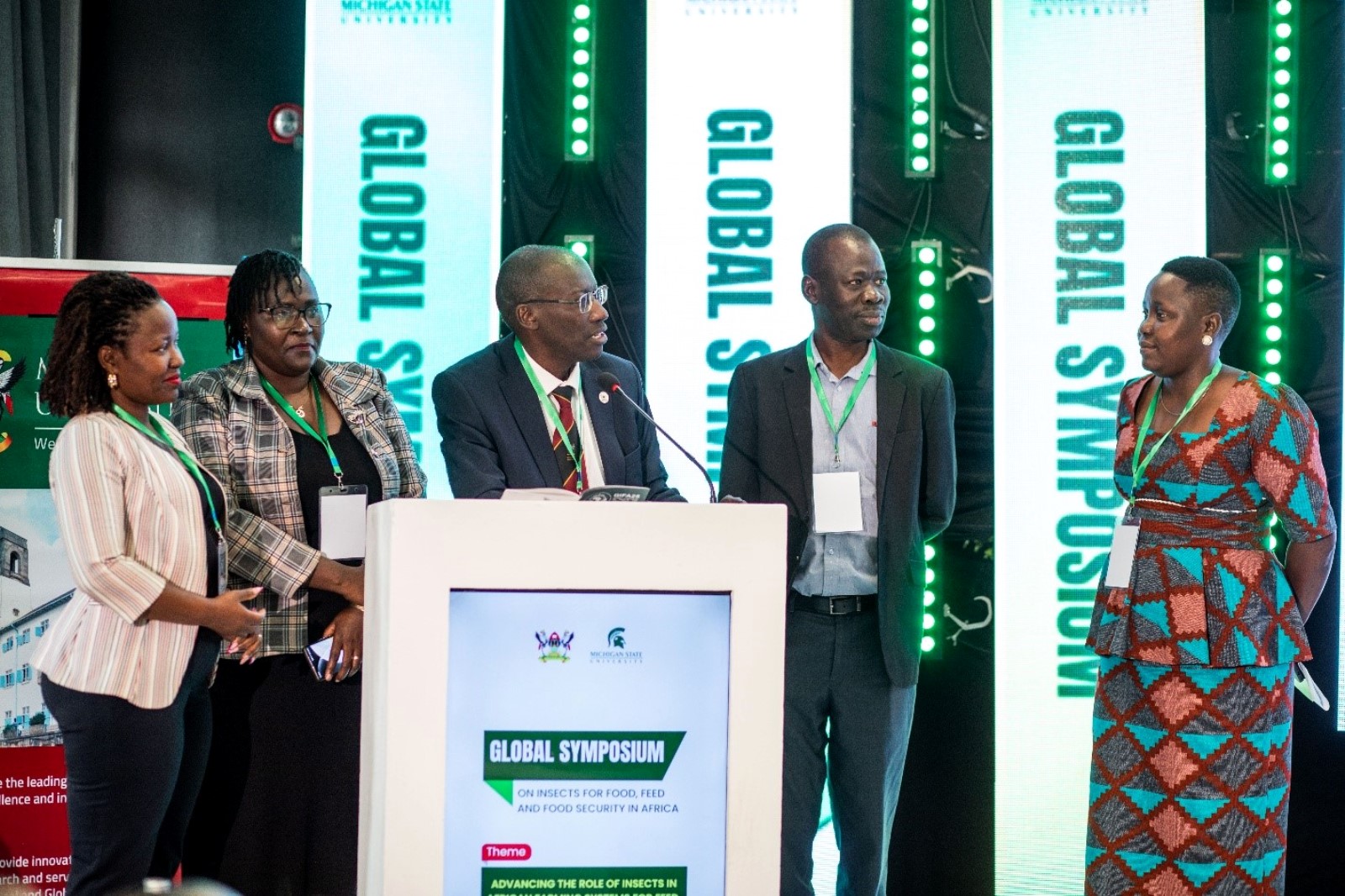
A groundbreaking symposium exploring the role of insects in African farming systems concluded on June 6th, 2025, at Onomo Hotel in Kampala. Convened by Makerere University’s College of Veterinary Medicine, Animal Resources and Biosecurity (CoVAB) in collaboration with Michigan State University (MSU), the event drew participants from over ten countries, including researchers, development experts, regulators, and practitioners.
Under the theme “Advancing the Role of Insects in African Farming Systems for Feed, Food, and Food Security,” the two-day gathering aimed to share knowledge and experiences on integrating insects into food and feed systems to address food security challenges across the continent. The discussions revolved around four key sub-themes namely; Insects as animal feed to promote sustainable livestock production and livelihoods; Insects for human food and food security, including indigenous insect-based diets; Insects for improved soil health and crop production and Commercialization of insect farming, with a focus on regulation and standardization.
The symposium commenced with opening remarks delivered on behalf of Makerere University’s Vice Chancellor, Prof. Barnabas Nawangwe, by his representative, Prof. Frank Norbert Mwiine, Principal of CoVAB. He welcomed participants and commended Dr. Deborah Amulen, Lecturer at CoVAB and chief convener, for organizing a well thought out event. He emphasized that the symposium would not only raise awareness of the role of insects in Uganda’s and Africa’s socio-economic development but also help place insects on the agenda for broader discussions and integration into food security strategies. He said the event served as a platform for knowledge exchange, highlighting the untapped potential of insect farming in transforming food security, sustainable agriculture, and economic growth.
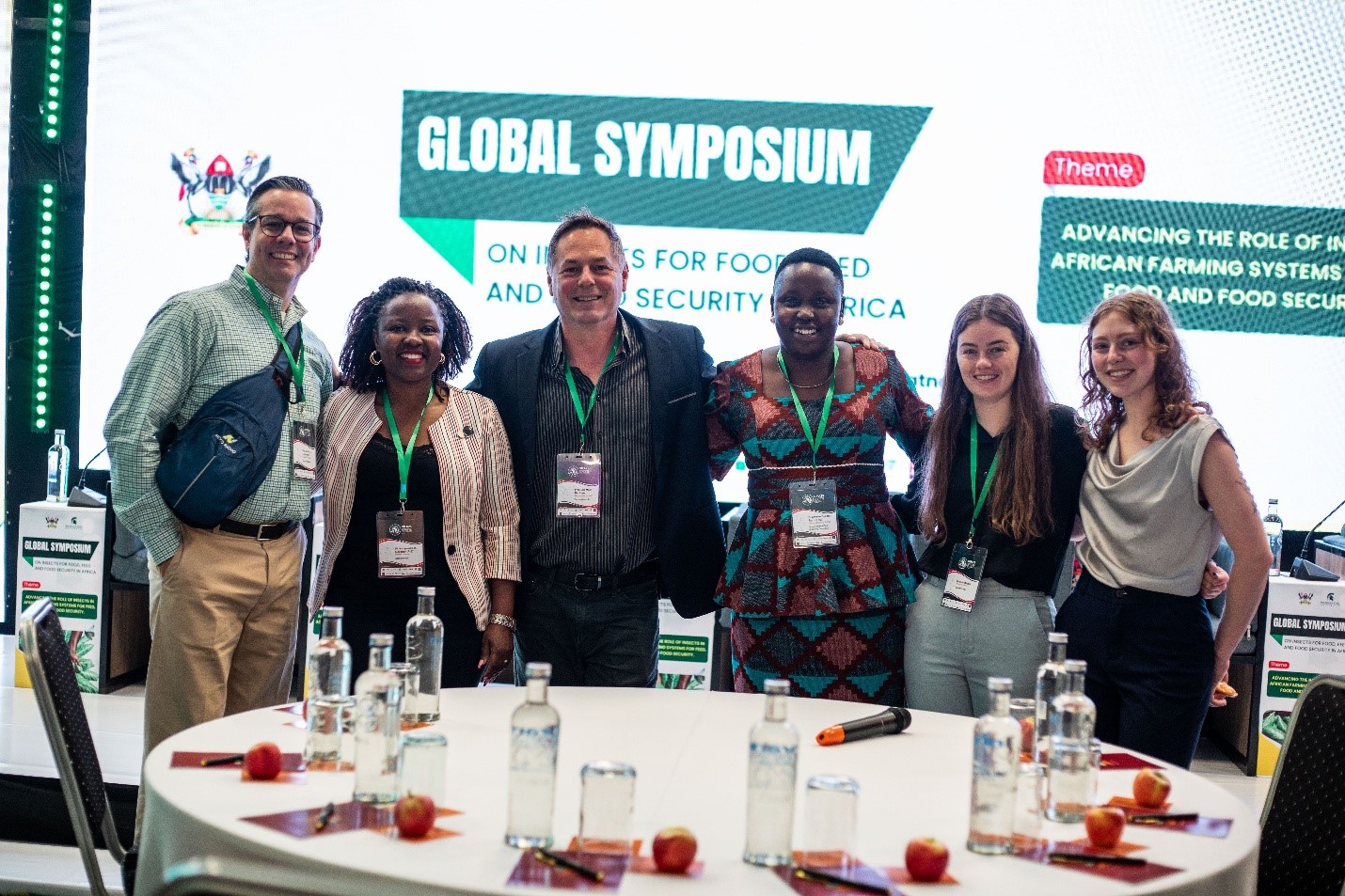
Key facilitators at the symposium were esteemed experts from leading institutions worldwide, who shared their insights on insect-based food systems and sustainable agriculture. Among the distinguished speakers were Prof. Jeffrey K. Tomberlin from Texas A&M University, Prof. Eric M. Benbow from Michigan State University, Prof. Florence Dunkel from Montana State University, Dr. Denise Beesigamukama, a Postdoctoral Fellow, ICIPE Kenya and Dr. Deborah Amulen the host from Makerere University. These are exemplified in their contribution towards academic research and leadership, policy and industry impact and more importantly their expertise in insect science.
During the deliberations, the experts emphasized that insects offer a viable, sustainable, and nutrient-rich solution to Africa’s growing food demands. The event underscored ongoing research and commercialization efforts aimed at mainstreaming insect farming into the agricultural sector. As global interest in alternative protein sources continues to rise, the symposium marked a significant step toward harnessing the potential of insects to enhance food security in Africa.
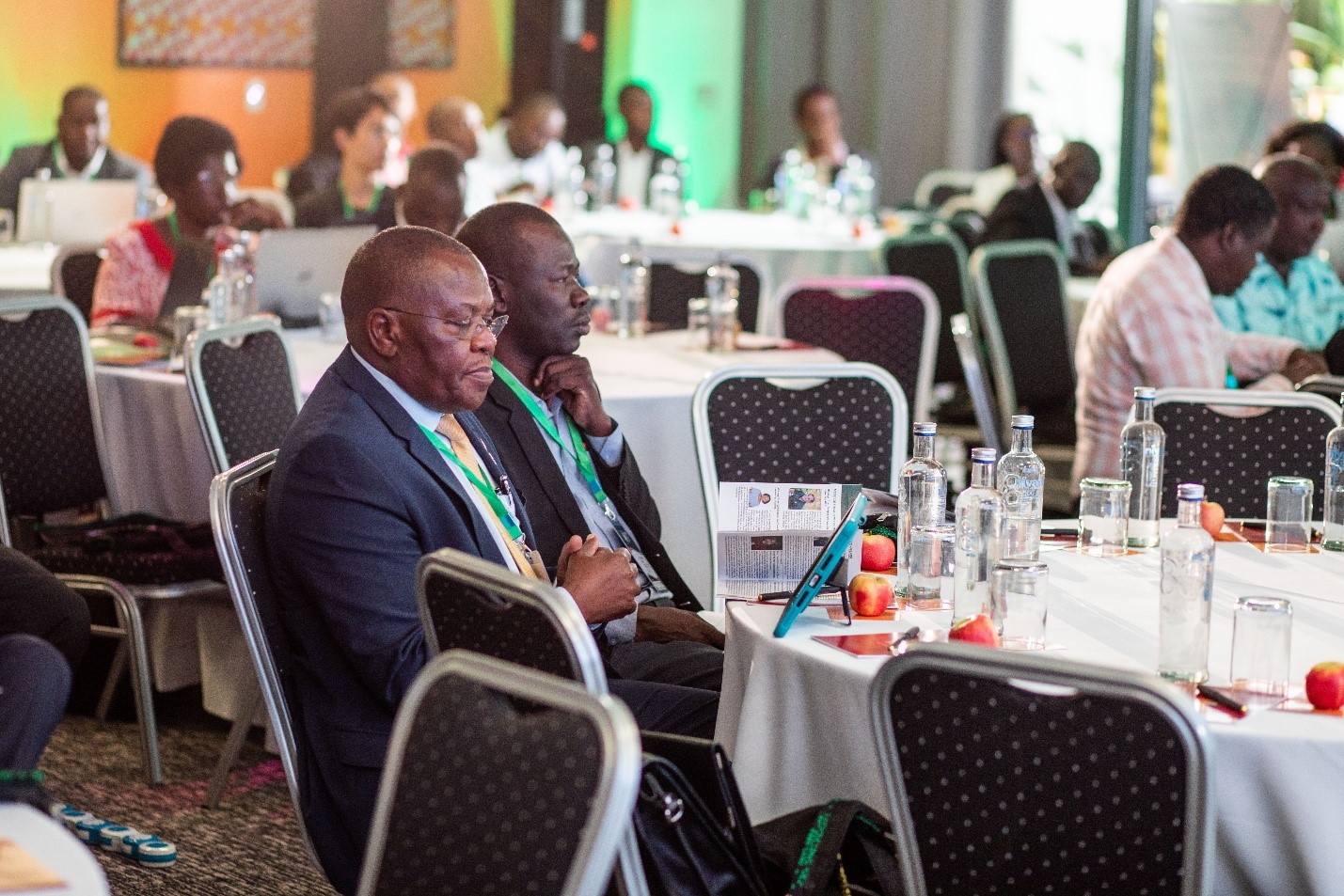
Experts underscored that Africa is home to over 470 recognized edible insect species, providing a rich source of proteins, fats, and essential micronutrients. Insects have historically been a staple in diets across Uganda, Southern Africa, and other regions, serving as a vital food source in times of drought, conflict, and food scarcity. One of the most discussed innovations at the event was the large-scale farming of Black Soldier Fly, which is being utilized to produce not only the larvae but also frass, a high-protein animal feed and organic fertilizer to enhance soil health and boost agricultural yields.
Several scholars presented their research in the area of Insects, where together with the farmers, industry representatives, policy makers and practitioners contributed valuable perspectives on advancing the role of insects in food security, animal feed, and ecological sustainability in Africa. Their discussions underscored the importance of research, policy, and commercialization in expanding insect farming across the continent.
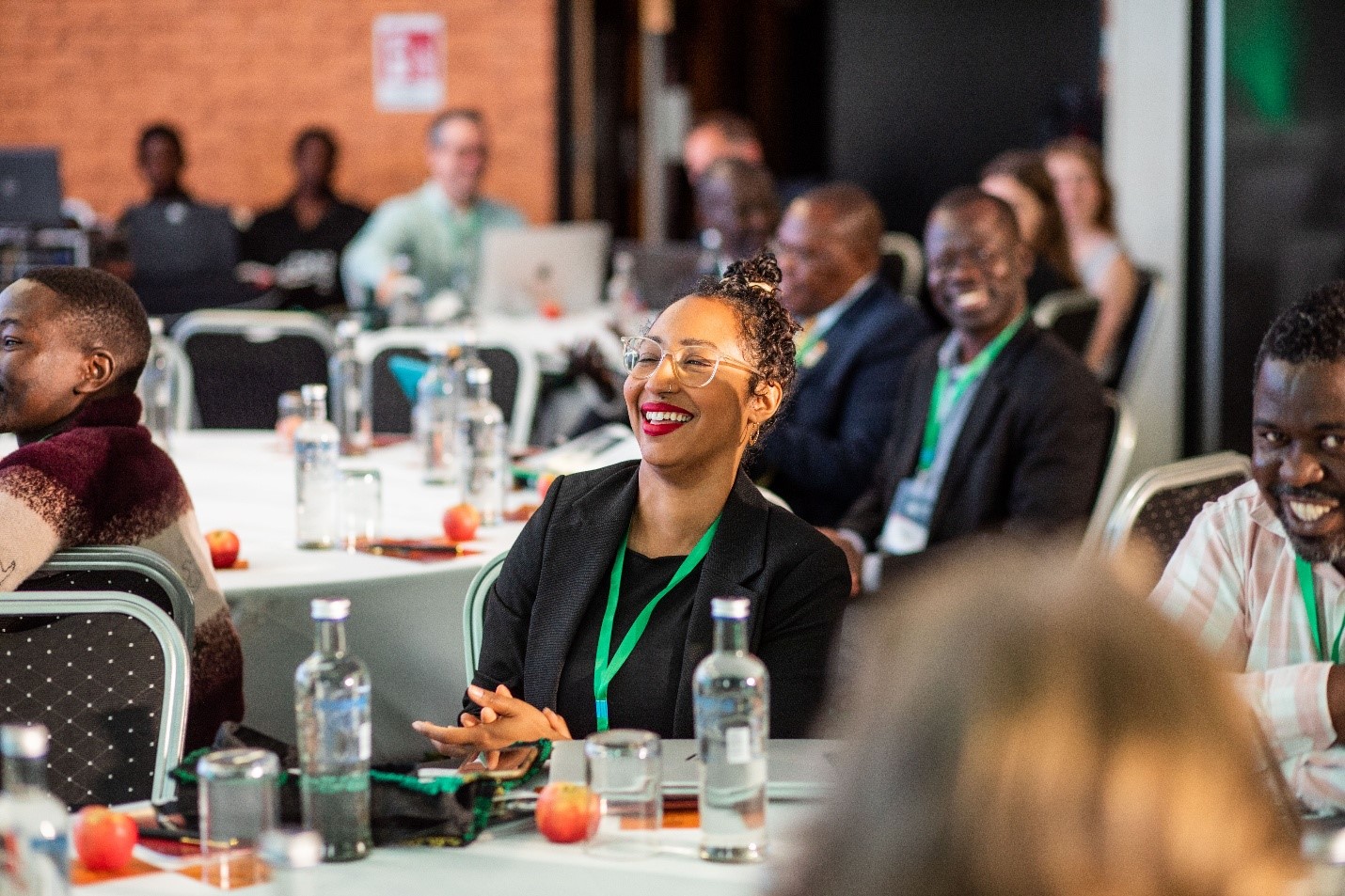
One of the keynote discussions highlighted Uganda’s rich tradition of consuming insects as part of its food culture, reinforcing their significance in nutrition and sustainability. Participants shared insights on local insect consumption practices and their role in livelihoods, drawing from countries like Cameroon, Malawi and many others represented at the event. The forum also featured representatives from key institutions, including the National Council for Science and Technology and The National Agricultural Research Organization (NARO) which contributed perspectives on research, policy development, and commercialization of insects as sustainable food sources, the Ministry for Agriculture, Animal Industry, and Fisheries (MAAIF), emphasizing the Ugandan government’s support for insect farming initiatives.
The Kenya based scientific research institute, the International Centre of Insect Physiology and Ecology (ICIPE) played a key role in the discourse and exhibited several innovations arising from research and their work in insects. Experts explored how insects can revolutionize animal feed production, providing an affordable, high-protein alternative to conventional sources.
With global attention shifting toward alternative and sustainable food sources, experts stressed the need for policy standardization and enhanced investment in insect-based food systems across Africa. During the event, MAAIF announced a $325 million investment through a six-year Smart Agriculture Transformation Project, aimed at expanding sustainable farming practices, reducing environmental impact, and increasing food security through alternative protein sources.
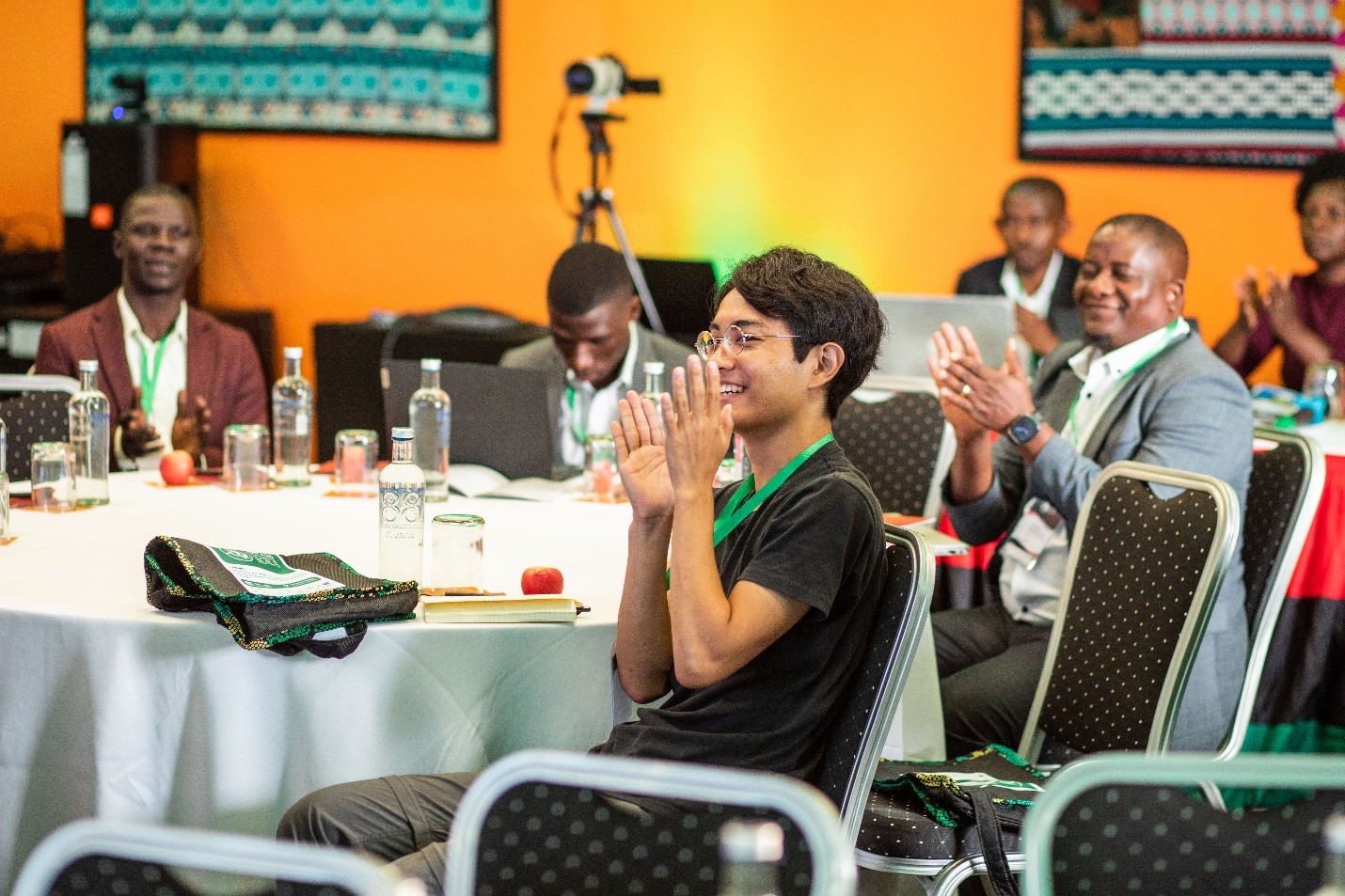
The symposium reaffirmed Africa’s position at the forefront of insect farming research, with discussions centered on scaling production, improving regulation, and leveraging indigenous knowledge for food security solutions. Moving forward, participants emphasized the importance of quality control, standardization, and policy frameworks to ensure safety, scale production, and boost market competitiveness. With Uganda leading discussions on alternative protein sources, the symposium laid the foundation for future innovations in agriculture.
Trending
-

 General3 days ago
General3 days agoMature Age Scheme Exam Results for 2025/2026
-

 General6 days ago
General6 days agoFreshers’ Joining Instructions 2025/2026
-

 General1 week ago
General1 week agoMastercard Foundation Board pays its inaugural visit to Makerere University
-

 General1 week ago
General1 week agoUVCF Makes Case for HEAC Programme
-

 Natural Sciences2 weeks ago
Natural Sciences2 weeks agoCoNAS Participates in the 2025 National Science Week Exhibition
